A drywall access panel for a sump pump provides homeowners with a convenient, professional solution for maintaining critical basement water management systems. These specialized panels offer easy access to sump pumps without compromising wall integrity, allowing quick inspections, repairs, and replacements while maintaining a clean, seamless interior aesthetic. Proper installation ensures long-term functionality and protects your home’s waterproofing infrastructure.
What Are the Standard Dimensions for Sump Pump Access Panels?
Access panels for sump pumps come in various standard sizes to accommodate different installation requirements:
| Panel Size | Typical Applications |
|---|---|
| 12″x12″ | Small utility spaces |
| 14″x14″ | Standard residential installations |
| 14″x24″ | Larger sump pump configurations |
| 16″x16″ | Commercial settings |
| 18″x18″ | Complex pump systems |
Why Choose Specific Panel Materials?
Homeowners have multiple material options for dry wall access panels:
- Galvanized Steel Panels
- Highly durable
- Corrosion-resistant
- Powder-coated finish
-
Ideal for moisture-prone environments
-
Glass Fiber Reinforced Gypsum (GFRG)
- Seamless interior integration
- Lightweight
- Easy to paint
- Excellent for finished basement areas
How to Select the Right Access Panel?

When choosing a dry wall access panel to sump pump, consider these critical factors:
- Sump Pump Size: Measure your specific pump dimensions
- Wall/Ceiling Material: Ensure compatibility with existing surfaces
- Accessibility Requirements: Evaluate frequency of maintenance needs
- Local Building Codes: Verify compliance with regional regulations
What Tools Are Needed for Installation?
Essential tools for installing a sump pump access panel include:
- Measuring tape
- Utility knife
- Drywall saw
- Drill
- Screwdriver
- Joint compound
- Sandpaper
- Level
Step-by-Step Installation Process
Preparation Phase
- Locate precise sump pump location
- Measure and mark panel area
- Verify clearance around installation site
- Gather all necessary tools and materials
Cutting and Framing
- Create a precise cut 1/4 inch larger than panel dimensions
- Ensure clean, straight edges
- Test-fit panel before final installation
Mounting Techniques
- Secure frame using appropriate screws
- Check level and alignment
- Apply joint compound for seamless finish
What Maintenance Considerations Exist?
Regular maintenance of your dry wall access panel involves:
- Periodic inspection for damage
- Checking seal integrity
- Repainting as needed
- Ensuring smooth opening/closing mechanism
Potential Challenges and Solutions
| Challenge | Recommended Solution |
|---|---|
| Uneven Cutting | Use template or laser level |
| Moisture Damage | Apply waterproof sealant |
| Loose Fitting | Adjust frame or replace mounting hardware |
Cost and Investment Considerations
The average cost of a professional dry wall access panel installation ranges from $150-$500, depending on complexity and materials. DIY installations can significantly reduce expenses.
Pro Tips for Long-Term Success
- Always measure twice before cutting
- Use high-quality, moisture-resistant materials
- Consider professional installation for complex configurations
- Maintain proper ventilation around sump pump area
Reference:
– Senju Drywall Access Panel Specifications
– WB DW 400 Series Access Doors
– GFRG Panel Installation Guidelines
